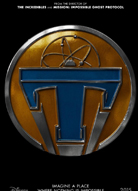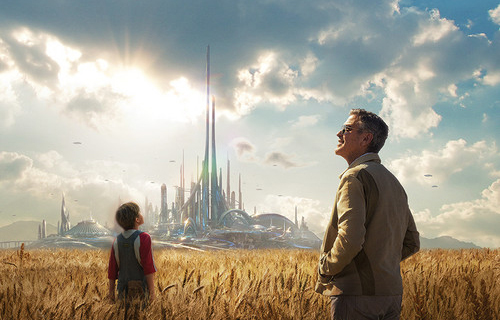 Michael C here. Last week I was here to announce that one of my anticipated 2015 titles exceeded my expectations. This week I need to come to grips how another of my most anticipated could miss the mark so badly.
Michael C here. Last week I was here to announce that one of my anticipated 2015 titles exceeded my expectations. This week I need to come to grips how another of my most anticipated could miss the mark so badly.
Like the theme park from which it takes its inspiration, the future in Brad Bird’s Tomorrowland is not a tangible thing, but an idea, a gleaming Jetsons cityscape forever just over the horizon inspiring the better angels of our nature with its promise of utopia. It’s not “the future”. It’s THE FUTURE!
Unfortunately, where Disney World can get away with organizing a collection or attractions around nothing but a spirit of uncomplicated hope, a movie needs to build a structure around those feelings, and it’s there that Bird’s film struggles. It aims to stir the soul but its impact is dulled as it gets lost in its scattershot, thinly conceived screenplay. Enjoyment of Tomorrowland depends on one's ability to appreciate its vibe of retro optimism enough to overlook how far short it falls of its lofty ambitions...
Despite my eagerness to climb aboard its rocket ship tour of wonders, I found myself looking for the escape hatch long before Tomorrowland sputtered to a lackluster finish.
Tomorrowland’s surface may be bright but its story’s undercurrents are bracingly dark. The plot is like a sunshine-y T2 where the impending Judgment Day will be deferred not by a violent rampage but by the dogged optimism of Casey, the story's high school-aged hero played by Britt Robertson. The daughter of an out-of-work astronaut, she uses her technical know-how, and her penchant for mischief, to stall the demolition of a NASA launch pad. There are echoes of Interstellar with the use of an abandoned astronaut as symbol for humanity’s lost capacity for wonder.
 Casey’s can-do spirit puts her on the radar of Tomorrowland, a fantastical city described as a refuge for best and brightest, a place where the thinkers and the dreamers can escape the limitations of the workaday world and reach their full potential. (Those who have found a streak of Randian objectivism in Bird’s series of elite protagonists are having a field day with this) Casey soon finds herself in possession of a mysterious pin which, when touched, whisks its possessor to a sun-dappled cornfield with the magical city shimmering in the distance. It turns out something is rotten in Tomorrowland and Casey is the last hope to rescue the city’s lost spirit of hope (or something) thus saving the world. First step in her adventure is to track down a disillusioned recluse (played with craggy charisma by George Clooney) who was once a former whiz kid like herself, so he can help her find a way back while eluding a gang of killer black suited robots.
Casey’s can-do spirit puts her on the radar of Tomorrowland, a fantastical city described as a refuge for best and brightest, a place where the thinkers and the dreamers can escape the limitations of the workaday world and reach their full potential. (Those who have found a streak of Randian objectivism in Bird’s series of elite protagonists are having a field day with this) Casey soon finds herself in possession of a mysterious pin which, when touched, whisks its possessor to a sun-dappled cornfield with the magical city shimmering in the distance. It turns out something is rotten in Tomorrowland and Casey is the last hope to rescue the city’s lost spirit of hope (or something) thus saving the world. First step in her adventure is to track down a disillusioned recluse (played with craggy charisma by George Clooney) who was once a former whiz kid like herself, so he can help her find a way back while eluding a gang of killer black suited robots.
"Do I have to explain everything? Can’t you be amazed and move on...”
Clooney snaps at Robertson when she persists in asking totally reasonable questions. The exclamation may as well be directed at the audience at a point when the accumulated weight of unanswered questions and vague plot points is reaching critical mass. I don’t want to pile on Damon Lindelof who has become something of a whipping boy ever since the end of Lost left so many viewer’s feeling swindled (and who, in fairness, shares writing credit with Bird and Jeff Jensen) but Tomorrowland’s flaws fit his trademark screenwriting bait and switch so perfectly it is impossible not to notice.
The formula goes like this: Begin with big promises of wonders to come, including a nebulous threat that propels the action forward with such urgency there is no time for explanation. (Tomorrowland veers into self-parody with a robot character that shuts down when asked direct question about the plot.) Step two: Pile up more questions, which expand the mystery without developing the story. Any characters who were supposed to have answers turn out to be in the dark (“What do we do now?" “I thought YOU knew”) Step three concludes with an avalanche of exposition which doesn’t contain answers so much as a lot of answer-ish sounding noise. Wrap things up with a flurry of action and hope nobody notices that reasons for all the secrecy in the first two acts is never addressed.
It could rightly be argued that ideas and imagination are more valuable than plot coherence, but Tomorrowland itself foregrounds the plot, tying itself in knots trying unsuccessfully to find meaning in its various convolutions until we are left with nothing to hold on to, save a sort of free-floating positivity. Vague optimism masquerading as ideas. The result is a grand vision of the future that rings hollow. A Tinkerbell that can only be kept alive with relentless clapping, as if the enemy isn’t pessimism but realism. When Casey is learning about the melting polar ice caps in school she interrupts to demand the teacher segue immediately to potential solutions. It’s supposed to be inspiring but it comes off as oppressive, Disney-ish in the most corporate way possible where any negativity is to be immediately squelched and covered over with happy thoughts.
Even with the bungled big picture, Tomorrowland is still capable of charming in the details. The whole enterprise has a cleanness of style that makes for painless viewing even when the screenplay is flailing, and there are sparks of the kind of crackerjack action that one would expect from the director of MI: Ghost Protocol. There is a temptation to give Tomorrowland a pass solely for bucking the trend of dour, joyless blockbusters that can’t reach the credits without massacring an urban metropolis. Tomorrowland seems like the perfect antidote to this, personal and buoyant where the other films are leaden and assembly line forgettable, but the sight of all that squandered potential managed to bum me out even in the presence of this overflow of good cheer.
Grade: C+
